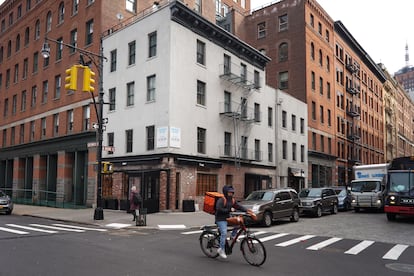After New York placed limits on Airbnb, are we witnessing the end of a model?
The Big Apple recently approved new regulations on short-term rentals. Meant to curtail abuse and rising prices, it also spells trouble for legitimate users

Lila Rodriguez just arrived in New York to empty out the apartment that she’s been subletting on Airbnb for five years. She lived between her home of Buenos Aires and the Big Apple. She would sublet the apartment while she was in Argentina, and she always had somewhere to stay when she needed to return, without paying the exorbitant prices of one of the most expensive cities in the world. “Everything was going well,” she says in a phone interview. “Airbnb gave me flexibility and guaranteed that, even if I rented to strangers, I would have legal backup if a problem came up.” But as of a few weeks ago, that solution is illegal. From now on, it is illegal for residents to rent out their homes when they are out of town.
In recent years, a number of cities, regions and countries have implemented measures to regulate short-term rentals. Their goal is to mitigate the effects of platforms like Airbnb, which is blamed for increasing housing costs and gentrifying neighborhoods, expelling residents to the edges of town and turning urban centers into tourism hubs. Such is the case of Barcelona: Airbnb caused rent in certain neighborhoods to increase by 7% and the prices of housing for sale by 17%, according to a 2020 study published in the Journal of Urban Economics. Portugal’s Housing Minister Marina Gonçalves insists that “everyone has a right to live in the most expensive parts of Lisbon and the country.” This week, the Portuguese government announced new measures to prevent an increase in housing prices: new permits for short-term rentals will not be issued, and the government has cancelled a program that issued residency visas to foreign investors.
In New York, the most-visited city in the United States, Local Law 18 went into effect on September 5. The regulation only permits short-term rentals that meet five requirements: the owners must be present in the home during the rental; no more than two guests are admitted; the rooms cannot be locked; the property cannot be rent-controlled; and it must be registered to accept reservations. Even for those that fulfill the requirements, though, getting a permit isn’t easy. According to Bloomberg, the Mayor’s Office of Special Enforcement has only processed 25% of applications.
As a result, some 10,000 short-term rental listings in New York have disappeared. While Airbnb is the most well-known company of its kind, the law also affects similar platforms including Vrbo, HomeAway and Booking. This now forces the 66 million tourists that visit the city each year to stay in hotels. The cost? Exorbitant. If you want to take advantage of the Christmas holidays and go ice skating on the Rockefeller Center rink, prices range between $130 and $1,200 per night, with a decent, centrally located hotel going at about $300.
New York’s measure has precedents in other cities. In 2021, Barcelona was the first European city to ban the rental of rooms for less than 30 days without a tourist license. Paris, Amsterdam and London followed: there, a home can be rented for a maximum of 30 to 120 days a year. In Berlin, the main residence requires a permit and secondary residences can only be rented for a maximum of 90 days a year. There are also antecedents in San Francisco and Santa Monica and in Asia (Tokyo, Singapore, Sydney, the island of Penang).
The case of the Big Apple is similar to the rest. The law is meant to remedy the shortage of housing available for long-term rentals. “Platforms like Airbnb were ignoring housing laws, which ensure that residential properties are used exclusively for residential purposes, not tourism,” Murray Cox, activist and voice of Inside Airbnb, a project that uses data to analyze the impact of Airbnb on residential communities, says in an email.
The current deficiency in supply has caused a considerable increase in property prices. It is difficult to find centrally located one-bedroom apartments for less than $3,000 per month. According to 2022 data, on average, 30% of income is allocated to housing rentals nationwide. It is the highest percentage in 20 years. And if renting is expensive, buying properties is even more so: mortgages have become more expensive, with interest rates reaching 7%.
This law also aims to root out bad actors. According to a public letter that the Coalition Against Illegal Hotels wrote to New York’s City Council, “While [Airbnb puts] Black and brown homeowners forward as their typical host, their greatest profits come from illegal hotels, apartments that landlords and other bad actors convert from long-term residential to nightly rental status.” Thousands of people, encouraged by the opportunity to make easy money, bought apartments to rent on Airbnb. Others rented several apartments and then sublet them. It was a growing business, always lucrative: tourists continued to arrive in New York even during the pandemic. Despite having prices comparable to hotels, some visitors preferred to stay in an Airbnb because of the kitchen, the feeling of living like a local and being able to host the entire family in the same place.
But as is often the case, those who use the system suffer the consequences caused by those who abuse it. Those who bought two-family homes and paid their mortgage by renting the house below for short periods are suffering the setback. An activist group, Restore Homeowner Autonomy & Rights NY, has already emerged to vindicate their rights as owners. “If not reversed, the City will drive small homeowners like us out of NYC to be replaced with more ‘luxury rentals’ which further displaces more of the city’s backbone of local neighborhoods,” they explain on their website. “Protecting NYC means protecting one and two-family homeowners.”
It will be a matter of time until would-be short-term renters find new ways to get around this law. Some may pretend to live in the rental house, risking paying a fine between $100 and $5,000) For now, there are still ways to rent for short stays in the city. Stephanie Diamond, of the Listings Project, a newsletter with real estate options aimed at artists, says by phone that as an independent classifieds platform they will maintain their operations. Of course, they will remind users that they are responsible for what they publish. “We will remain vigilant and reject ads that exceed market prices,” she says. Temporary rental ads are still found on Craigslist, a platform that seems to be regaining its popularity.
The problem has now changed: without a company to assume possible setbacks, renting independently entails significant risks. It means trusting strangers again.
Sign up for our weekly newsletter to get more English-language news coverage from EL PAÍS USA Edition
Tu suscripción se está usando en otro dispositivo
¿Quieres añadir otro usuario a tu suscripción?
Si continúas leyendo en este dispositivo, no se podrá leer en el otro.
FlechaTu suscripción se está usando en otro dispositivo y solo puedes acceder a EL PAÍS desde un dispositivo a la vez.
Si quieres compartir tu cuenta, cambia tu suscripción a la modalidad Premium, así podrás añadir otro usuario. Cada uno accederá con su propia cuenta de email, lo que os permitirá personalizar vuestra experiencia en EL PAÍS.
¿Tienes una suscripción de empresa? Accede aquí para contratar más cuentas.
En el caso de no saber quién está usando tu cuenta, te recomendamos cambiar tu contraseña aquí.
Si decides continuar compartiendo tu cuenta, este mensaje se mostrará en tu dispositivo y en el de la otra persona que está usando tu cuenta de forma indefinida, afectando a tu experiencia de lectura. Puedes consultar aquí los términos y condiciones de la suscripción digital.









































